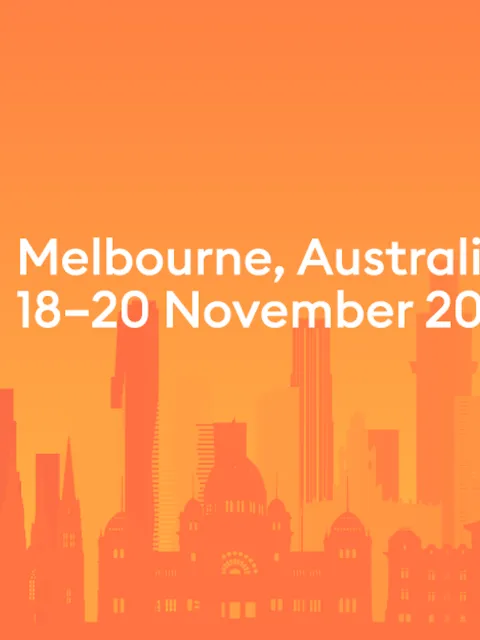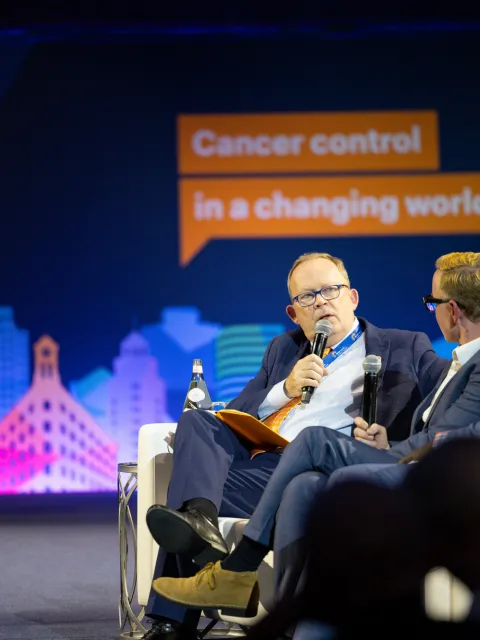Summary of UICC’s 2021 World Cancer Leaders' Summit 2021
UICC's first-ever World Cancer Leaders' Summit in virtual format took place over two days filled with inspiring presentations and expert discussions on equity and innovation in cancer care in the wake of a pandemic.

The 2021 World Cancer Leaders’ Summit on 25-26 October, organised by UICC and hosted by the American Society for Clinical Pathology, connected up to 600 global influencers and leaders in cancer control and public health from some 100 countries.
The event was scheduled to take place as a hybrid event in Boston but due to restrictions on travel to the US related to the pandemic, it was held fully virtually from UICC’s headquarters in Geneva, Switzerland.
Invited participants accessed exclusive content in the lead-up to the Summit on a dedicated virtual platform, including interviews with speakers conducted by Charles Goddard, Editorial Director at The Economist Group, and in-depth sessions on topics related to the theme of the Summit on innovation and equity.
2021 World Cancer Leaders' Summit full programme
Keynote speeches and sessions that took place at UICC's World Cancer Leaders' Summit are now available for viewing.
During the Summit, some 60 speakers gave presentations, joined panels and engaged in discussions on topics ranging from lessons learned from the pandemic and the development of the COVID-19 vaccine to the digital transformation of healthcare, the potential of big data and multi-cancer screening.
Opening remarks by a panel of distinguished speakers emphasised the need for innovations –that serve the needs of the most vulnerable. It was noted that the current pandemic, while disrupting cancer services, can stimulate innovation as shown by promising WHO initiatives on cervical, breast and childhood cancers, with some 200 strategic partners across 50 countries supporting implementation.
Sessions on day one provided participants with in-depth analyses and expert views on a range of topics related to the Summit theme. Dr Stephan Hahn, Chief Medical Officer at Flagship Pioneering and former Commissioner of the US Food and Drug Administration (2019-2021) noted that, while inequities have played out on the global stage during the pandemic, the past 18 months have also shown incredible cooperation – and the importance of such collaboration – between governments, academics and the private sector in addressing a health crisis.
There was a strong focus on research, notably how essential it is for clinical trials to be more inclusive and diverse. There was a strong call for more investment in research, in particular to develop pilot projects that can help bridge the gap between policy and programmatic innovation and implementation.
A session on health inequities in the US, spotlighted the importance of mapping communities in terms of demography and other socioeconomic factors to understand needs and perspectives. Mobilising community engagement can be particularly effective in overcoming the fear and stigma that often exist with certain cancers, particularly among hard-to-reach or marginalised populations.
Several sessions looked at advances in early detection and treatment that could significantly improve survival rates, quality of life and other outcomes for people living with cancer. These include digital solutions that are generating large quantities of data, artificial intelligence to improve diagnostics, multi-cancer screening to detect cancer earlier, as well as language processing to improve care delivery and pattern recognition to support medical decisions.
“Investments in breakthrough innovations in medicine have not been matched by breakthroughs in implementation. Systems need to be simplified to increase the safety and quality of care. Systems innovation is the next big opportunity to increase human health and wellbeing, but this has been underinvested.”
– Dr Atul Gawande, Professor at Harvard Medical School and the Harvard T.H. Chan School of Public Health
Innovations must reach those in need for there to be any impact; for this, countries need to have access to extensive reliable data and health systems must adapt and change the way they deliver services. For instance, health systems need to invest in addressing different cultural contexts that influence how people understand and receive information on cancer as well as care. An example cited of systems innovation is the creation of a virtual comprehensive cancer centre in Rwanda to improve patient navigation and optimise the chances that they complete their treatment.
A dedicated panel on potential health systems innovations highlighted the cost efficiency of investing in health and the essential role that Universal Health Coverage can play in transforming health delivery. Other comments touched upon innovative financing to scale up cancer care in low-resource settings and the multiplier effect on outcomes of addressing different aspects of cancer control.
Many speakers emphasised the benefits of improving prevention as more than 30% of cancers are preventable. This includes, for instance, stricter tobacco control and legislating “junk food” marketing to fight obesity, as well as other policy innovations that address risky behaviours.
The issue of resources was also addressed – how to make the best decisions on investing in cancer care and a measured and evidence-based approach: determine who benefits, who pays what are the costs of inaction are, what maximises health, wealth and outcomes.
Two sessions involved UICC Board Members from India, Lebanon, Mexico, Nigeria, Sweden and the US who gave the perspective of their region on what actions could best improve access to quality cancer care for more people.
Finally, as the world still finds itself managing the effects and facing the impact of the pandemic, the Summit also raised the question of safeguarding and strengthening cancer care in a post-COVID-19 world.
Pressing issues include the question of ageing populations and their specific needs, tackling regional inequalities and the wave of late-stage diagnoses due to missed screenings. Speakers and participants evoked certain positive takeaways from the pandemic, such as the broad adoption of telehealth that can reduce inequity and simplified procedures for medicine approval and clinical trials.
Overall, there remains a strong need to identify and collect quality data, reach remote populations, fight misinformation, reduce the number of preventable cancers and improve access to treatment and support. Speakers and participants were generally optimistic, however, that the cancer community has the tools and that the opportunities exist to see real change in the coming decade.
People who have survived cancer and become strong advocates for the need to include patient voices in developing efficient cancer control policies also spoke at the Summit. Based on personal experience, they highlighted the importance of a patient’s support network and how the notions of risk and value or quality of life vary for each person. They also emphasised how essential it is to support people who have been successfully treated, as there are often other health implications as well as psychosocial care needs that must be addressed.
2021 World Cancer Leaders' Summit full programme
Keynote speeches and sessions that took place at UICC's World Cancer Leaders' Summit are now available for viewing.
Last update
Tuesday 28 February 2023
